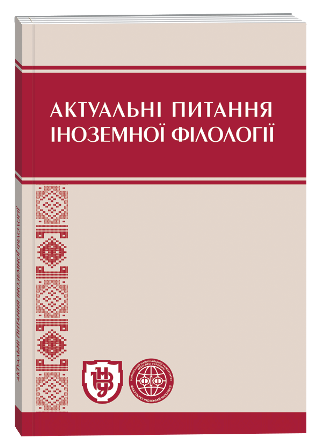VERBALIZATION OF EVALUATIVE COMPONENT OF THE CONCEPT AIR POLLUTION IN CONTEMPORARY ENGLISH MEDIA RESOURCES
DOI:
https://doi.org/10.32782/2410-0927-2022-17-11Keywords:
air pollution, axiological potential, concept, media resource, negative connotation, evaluative componentAbstract
The article presents the analysis of cognitive and semantic means of representation of the evaluative component of AIR POLLUTION as it is an integral part of a global concept ENVIRONMENT. The work aims at revealing structural and semantic elements of the concept AIR POLLUTION, which depict axiological potential of the concept under investigation, and which are peculiar for the representatives of American English-speaking cultural group. The material of the study comprises 200 text pieces bearing conceptual information about air pollution, which were extracted from speeches and texts belonging to media discourse. The methodological basis of this study includes the theory of cognitive mechanisms of elaboration, extending, questioning and combining. These mechanisms are used to investigate language modifications experienced by meaningful elements within a particular discourse. The findings of the content analysis show that such structural topical elements as “climate”, “human’s health”, “scale of air pollution” and “sustainability” are of the highest axiological value as they are fixed in the mental representation of the concept AIR POLLUTION. The structures “climate”, “human’s health”, and “scale of air pollution” are characterized as bearing negative evaluation, whereas “sustainability” – a positive one. The assessment verbalization presupposes the combination of several cognitive mechanisms that accumulate the meaning and combine two and more topical structures in one context. The language analysis suggests that lexical means which are used for the verbalization of evaluative component of the concept AIR POLLUTION, belong to emotionally neutral vocabulary including scientific terms and words that are peculiar for industrial, medical and political discourses. Their combination accumulates and specifies problems associated with air pollution, and contributes to the appearance of negative connotation. On the contrary, lexical means used to describe “sustainability” acquire positive connotation.
References
Бевзо Г. А. Вербалізація концепту «ЕКОЛОГІЯ» в термінологічній системі англійської та української мов. Наукові записки Національного університету «Острозька академія». Серія «Філологічна». 2014. Вип. 43. С. 28–31.
Петрінська Т. Вербалізація концепту ECOLOGICAL GLOBALIZATION в англомовному публіцистичному дискурсі. Наукові записки КДПУ. Серія: Філологічні науки (Мовознавство) / ред. кол.: О.А. Семенюк та ін. Кіровоград : Видавець Лисенко В.Ф., 2015. Вип. 137. С. 509–514.
Подуфалова Т.В. Понятійний компонент концепту NATURAL DISASTER в американській лінгвокультурі. Мовна освіта фахівця: сучасні виклики та тренди : матеріали III Всеукраїнської науково-практичної конференції з міжнародною участю (27 лютого 2020 року). Харків : Національний юридичний університет імені Ярослава Мудрого, 2020. С. 161–164.
Пригодій О. С. Концепт «ПРИРОДА» як ключовий концепт українаської лінгвокультури у творі Т. Прохасько «Спалене літо» та його переклад на англійську мову. Закарпатські філологічні студії. 2018. Вип. 3. Том 3. С. 155–159.
Приходько А. Н. Концепты и концептосистемы. Днепропетровск : Белая Е. А., 2013. 307 с.
Gong H. A Corpus-based Critical Ecological Discourse Analysis of Corporate Annual Environmental Reports: China Three Gorges Corporation as an Example. Helsinki : University of Helsinki, 2019. 60 р.
Lakoff G., Johnson M. Metaphors We Live By. Chicago and London: The University of Chicago Press, 2003. 276 p.
Moreno-Garcia J. et al. Generation of linguistic descriptions for daily noise pollution in urban areas [Electronic resource]. 2021 IEEE International Conference on Fuzzy Systems. Luxembourg, 2021. URL: https://ieeexplore.ieee.org/document/9494388/citations#citations (accessed 1 Oct, 2022).
Pruneau D. et al. The evolution of children’s ideas on pollution in the framework of experiential and socioconstructivist activities. Int. J. Environment and Sustainable Development. 2005. Vol. 4. № 1. P. 17–34.
Zhabotynska S., Slyvka N. Emotive speech acts and their discourse modifications in the literary text. Discourse and Interaction. 2020. № 13(1). P. 113−136.







